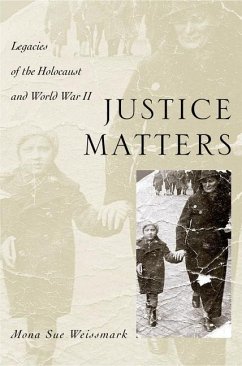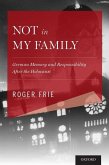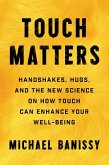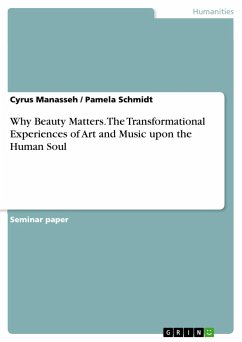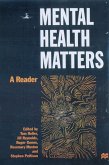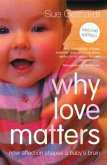Springing from an unprecedented meeting between the sons and daughters of the Holocaust and the children of Nazis, Justice Matters: Legacies of the Holocaust and World War II examines the psychology of hatred and ethnic resentments passed from generation to generation. Weissmark, a social psychologist and the child of Holocaust survivors, argues that justice is quite naturally shaped by emotional responses. In the face of unjust treatment, the natural response is
resentment and deep anger - and a desire for revenge. While legal systems offer a structured means for redressing injustice, it often does not redress the emotional pain, which, left unresolved, is then passed along to the next generation - leading to entrenched ethnic tension and group conflict.
Examining the legacy of the Holocaust, the burden of confronting unresolved injustices was passed to another generation, as, clearly, there has been no reconciliation between Nazis and survivors. Thus, coming to terms with their parents' past shaped the lives of Nazis' children and survivors' children. How would the offspring of Nazis and survivors react to the idea of re-establishing a relationship? Could children of survivors and Nazis talk to each other about the Holocaust and World War
II and understand the anxieties of each about the other as a gateway to re-establishing a relationship? Could they face the others' passions and points of view?
To address these questions, Weissmark embarked on a study of children of survivors and Nazis, and how they come to terms with the past and each other. Part of the study included an unprecedented meeting between the children of survivors and Nazis. Although more than half a century has passed, recollections of the Holocaust and WWII still sear the lives of survivors, their children and grandchildren. Weissmark discovered that central to keeping the cycle of ethnic and religious strife is
story-telling, with each side recounting the injustice it suffered and the valour shown by avenging its own group. She describes how these stories or "legacies" transmit moral values, beliefs and emotions and thus preserve the past, and thus, based on the microcosm of their parents' personal
experiences, each group maintains an understanding of themselves as the legitimate victims. Ultimately, Weissmark argues that coming to terms with their parents' past requires both parties not just to agree to talk, but to agree to moderate their emotions and dispense with the notion that they are the most aggrieved.
While focused on the experience of the Holocaust, Justice Matters provides insights into ethnic conflicts around the world, such as those in Northern Ireland and the Middle East. The stories of how the children of the Holocaust survivors and the children of Nazis struggle to come to terms with the past has universal applications for any society rife with resentment, and benefits our understanding of the emotional pain of injustice.
Hinweis: Dieser Artikel kann nur an eine deutsche Lieferadresse ausgeliefert werden.
resentment and deep anger - and a desire for revenge. While legal systems offer a structured means for redressing injustice, it often does not redress the emotional pain, which, left unresolved, is then passed along to the next generation - leading to entrenched ethnic tension and group conflict.
Examining the legacy of the Holocaust, the burden of confronting unresolved injustices was passed to another generation, as, clearly, there has been no reconciliation between Nazis and survivors. Thus, coming to terms with their parents' past shaped the lives of Nazis' children and survivors' children. How would the offspring of Nazis and survivors react to the idea of re-establishing a relationship? Could children of survivors and Nazis talk to each other about the Holocaust and World War
II and understand the anxieties of each about the other as a gateway to re-establishing a relationship? Could they face the others' passions and points of view?
To address these questions, Weissmark embarked on a study of children of survivors and Nazis, and how they come to terms with the past and each other. Part of the study included an unprecedented meeting between the children of survivors and Nazis. Although more than half a century has passed, recollections of the Holocaust and WWII still sear the lives of survivors, their children and grandchildren. Weissmark discovered that central to keeping the cycle of ethnic and religious strife is
story-telling, with each side recounting the injustice it suffered and the valour shown by avenging its own group. She describes how these stories or "legacies" transmit moral values, beliefs and emotions and thus preserve the past, and thus, based on the microcosm of their parents' personal
experiences, each group maintains an understanding of themselves as the legitimate victims. Ultimately, Weissmark argues that coming to terms with their parents' past requires both parties not just to agree to talk, but to agree to moderate their emotions and dispense with the notion that they are the most aggrieved.
While focused on the experience of the Holocaust, Justice Matters provides insights into ethnic conflicts around the world, such as those in Northern Ireland and the Middle East. The stories of how the children of the Holocaust survivors and the children of Nazis struggle to come to terms with the past has universal applications for any society rife with resentment, and benefits our understanding of the emotional pain of injustice.
Hinweis: Dieser Artikel kann nur an eine deutsche Lieferadresse ausgeliefert werden.
